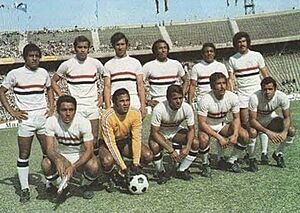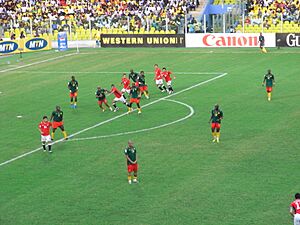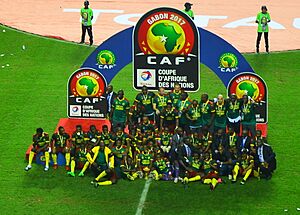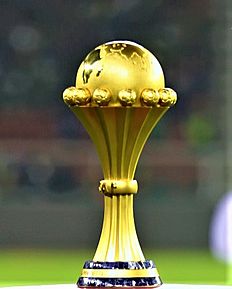Africa Cup of Nations facts for kids
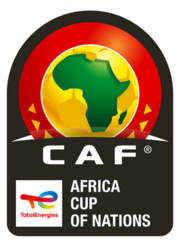 |
|
| Organising body | CAF |
|---|---|
| Founded | 1957 |
| Region | Africa |
| Number of teams | 24 (finals) 54 (eligible to enter qualification) |
| Current champions | (2nd title) |
| Most successful team(s) | (7 titles) |
The Africa Cup of Nations, often called AFCON, is Africa's biggest international football tournament for men's teams. It's like the World Cup, but just for African countries! The Confederation of African Football (CAF) organizes this exciting event. It first started in 1957.
For many years, the tournament happened every two years. From 2013, it switched to odd-numbered years. However, CAF announced plans for it to return to even-numbered years and happen every four years, starting in 2028. This means more time for teams to prepare!
The very first tournament in 1957 had only three teams: Sudan, Egypt, and Ethiopia. South Africa was supposed to play but was not allowed due to its government's rules that separated people based on race.
Over the years, many more countries joined! This meant a special qualifying round was needed to decide which teams would play in the main tournament. By 2019, the tournament grew even bigger, with 24 teams competing. These teams play in groups, and the best ones move on to knockout rounds, just like in the World Cup!
Egypt is the most successful team, having won the cup seven times! Cameroon has won five times, and Ghana four times. In total, fifteen different countries have lifted the trophy.
There have been three different trophies throughout history. The current beautiful gold-plated cup was first used in 2002. Egypt famously won three times in a row in 2006, 2008, and 2010!
The most recent champions are Senegal. They won the 2025 final by beating Morocco 1-0 after extra time.
Contents
History of the AFCON Tournament
How the AFCON Began
The idea for the Africa Cup of Nations started in 1956. Football leaders wanted a big tournament for African countries. So, in February 1957, the very first AFCON was held in Khartoum, Sudan.

Only three teams played: Egypt, Sudan, and Ethiopia. South Africa was supposed to join but was not allowed. This was because of their government's rules that separated people based on race. Egypt won this first tournament, becoming the first African champions!
In 1959, Egypt hosted and won again. But by 1962, more teams wanted to play! Nine teams entered, and for the first time, there were qualifying matches. Host Ethiopia won that year, beating Egypt in an exciting final that went into extra time.
Ghana's Early Success
Ghana joined the tournament in 1963 as hosts and won their first title! They won again in 1965, showing how strong their team was. CAF also made a rule to limit how many players from other countries could be on a team.
By 1968, the tournament had eight teams in the final stage. These teams played in groups, and the best ones went to the semi-finals. The Democratic Republic of Congo won its first title that year. From 1968, the AFCON was held every two years.
In 1970, the tournament was shown on television for the first time! Sudan won the trophy as hosts, beating Ghana in the final.
A Decade of Different Champions (1970s)
Many different countries won the AFCON trophy between 1970 and 1980. Six nations became champions during this time. These included Sudan, Congo-Brazzaville, Zaire, Morocco, Ghana, and Nigeria.
Zaire won their second title in 1974. The final against Zambia was so close it had to be replayed! Zaire won the replay. Their player, Mulamba Ndaye, scored nine goals in that tournament, which is still a record!
Cameroon's Strong Performance (1980s)
Between 1980 and 1990, Cameroon was a very strong team. They reached the final three times in a row! They won the cup in 1984 and 1988.
Algeria was another strong team. They reached the semi-finals many times and finally won their first championship in 1990. Ghana also won their fourth title in 1982 after a penalty shootout against host Libya.
South Africa Returns (1990s)
In 1990, Algeria won their first AFCON title, beating Nigeria in the final.
The 1992 tournament expanded to 12 teams. They were divided into four groups. Ivory Coast won that year in a very long penalty shootout against Ghana. They didn't let any opponent score a goal in the whole tournament!
In 1994, Nigeria won the tournament. They beat Zambia, whose team had faced a sad accident a year before.
South Africa hosted the AFCON in 1996. This was their first time playing after being banned for many years due to the rules that separated people based on race. Bafana Bafana won their first title at home! Two years later, they reached the final again but lost to Egypt.
Egypt's Amazing Wins (2000s)
The 2000 tournament was hosted by Ghana and Nigeria. Cameroon won after a penalty shootout against Nigeria. In 2002, Cameroon won again, becoming champions two times in a row! They beat Senegal in another penalty shootout.
In 2004, Tunisia won their first title as hosts. Then, in 2006, Egypt won their fifth title, also as hosts!
Some European clubs asked for the tournament schedule to change. This was because it happened during their league season, and players missed club matches. In 2008, Egypt won the trophy again, making it their sixth title!
Changes in the 2010s
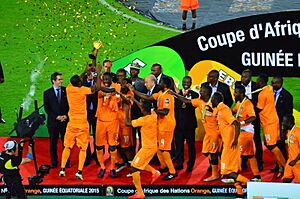
Egypt made history in 2010 by winning their third consecutive title! This was an amazing achievement, giving them a record seven continental titles. They became the first African nation to win three cups in a row.
In May 2010, CAF decided to move the tournament to odd-numbered years starting from 2013. This was to avoid it clashing with the FIFA World Cup. This meant there were two tournaments within twelve months in 2012 and 2013.
In 2012, Zambia won the final after a penalty shootout against Ivory Coast. This match was special because it took place near the site of a sad plane accident that affected their national team in 1993.
The 2015 tournament was supposed to be in Morocco, but they had health concerns about an Ebola outbreak. So, it was moved to Equatorial Guinea. Ivory Coast won that year. In 2016, Total became a major sponsor, and the tournament was renamed the "Total Africa Cup of Nations."
Tournament Growth and Date Changes Since 2019
In 2017, two big changes were approved: moving the tournament from January to the Northern Hemisphere summer and expanding it from 16 to 24 teams. These changes started with the 2019 Africa Cup of Nations.
Algeria won the 2019 tournament, their second title. They beat Senegal 1-0 in the final. The winners received $4.5 million in prize money.
The 2021 Africa Cup of Nations qualifiers were postponed due to the COVID-19 pandemic. The main tournament, hosted by Cameroon, was also moved to 2022. CAF increased the prize money for the winner to $5 million. Senegal won the tournament for the first time, defeating Egypt on penalties. In that tournament, Salima Mukansanga made history as the first woman to referee at the Africa Cup of Nations.
The 2023 Africa Cup of Nations was held in January 2024 because of the heat in host Ivory Coast.
The 2025 Africa Cup of Nations took place in December 2025 and January 2026. This timing was due to the new FIFA Club World Cup tournament. The prize money for the winner increased to US$10 million.
On 20 December 2025, CAF announced plans for the tournament to return to even-numbered years. It is also planned to become a quadrennial event, meaning it will happen every four years, starting with the 2028 Africa Cup of Nations.
How the Tournament Works
The AFCON tournament has changed its format over the years. But usually, it has two main parts: a qualifying stage and a final tournament.
Qualifying for AFCON
To play in the main tournament, most teams must go through a qualifying phase. This phase has grown as more countries joined CAF. It started in 1962 with knockout matches.
Later, the qualifying phase became more like the European Championship. Teams play in groups, and the best teams from each group qualify for the final tournament. The host country always gets an automatic spot in the final tournament.
The Final Tournament
In the final tournament, 24 teams compete. They are divided into six groups of four teams. Each team plays every other team in its group once.
After the group stage, the top two teams from each group, plus the four best third-placed teams, move on to the "Round of 16." This is a knockout stage, meaning if you lose, you're out! The winners then play in the quarter-finals, then the semi-finals. The teams that lose in the semi-finals play for third place, and the winners play in the grand final!
Trophies and Medals
Throughout its history, the Africa Cup of Nations has had three different trophies. The first was the Abdelaziz Abdallah Salem Trophy, made of silver. Ghana got to keep this trophy forever after winning three tournaments by 1978.
The second trophy, called the "Trophy of African Unity," was used from 1980 to 2000. It was a cylindrical cup with the Olympic rings and a map of Africa. Cameroon won this trophy three times by 2000, so they got to keep it permanently.
In 2001, a new, gold-plated trophy was introduced. It was designed and made in Italy. Cameroon was the first team to win this new trophy in 2002. Egypt also won this gold-plated cup three times by 2010. They received a special full-size replica to keep. Every winner now gets a replica trophy.
CAF also gives out medals! The winning team gets 30 gold medals, the runners-up get 30 silver medals, and the third-place team gets 30 bronze medals.
Results
Summary of Winners
| Team | Winners | Runners-up | Third place | Fourth place | Total |
|---|---|---|---|---|---|
| 7 (1957, 1959*1, 1986*, 1998, 2006*, 2008, 2010) | 3 (19621, 2017, 2021) | 3 (19631, 19701, 1974*) | 4 (1976, 1980, 1984, 2025) | 17 | |
| 5 (1984, 1988, 2000, 2002, 2017) | 2 (1986, 2008) | 2 (1972*, 2021*) | 1 (1992) | 10 | |
| 4 (1963*, 1965, 1978*, 1982) | 5 (1968, 1970, 1992, 2010, 2015) | 1 (2008*) | 4 (1996, 2012, 2013, 2017) | 14 | |
| 3 (1980*, 1994, 2013) | 5 (1984, 1988, 1990, 2000*, 2023) | 9 (1976, 1978, 1992, 2002, 2004, 2006, 2010, 2019, 2025) | — | 17 | |
| 3 (1992, 2015, 2023*) | 2 (2006, 2012) | 4 (1965, 1968, 1986, 1994) | 2 (1970, 2008) | 11 | |
| 2 (2021, 2025) | 2 (2002, 2019) | — | 3 (1965, 1990, 2006) | 7 | |
| 2 (1990*, 2019) | 1 (1980) | 2 (1984, 1988) | 2 (1982, 2010) | 7 | |
| 2 (19682, 19743) | — | 2 (1998, 2015) | 2 (19723, 2023) | 6 | |
| 1 (2012) | 2 (1974, 1994) | 3 (1982, 1990, 1996) | — | 6 | |
| 1 (2004*) | 2 (1965*, 1996) | 1 (1962) | 3 (1978, 2000, 2019) | 7 | |
| 1 (1976) | 2 (2004, 2025*) | 1 (1980) | 2 (1986, 1988*) | 6 | |
| 1 (1970*) | 2 (1959, 1963) | 1 (1957*) | — | 4 | |
| 1 (1996*) | 1 (1998) | 2 (2000, 2023) | — | 4 | |
| 1 (1962*) | 1 (1957) | 1 (1959) | 2 (1963, 1968*) | 5 | |
| 1 (1972) | — | — | 1 (1974) | 2 | |
| — | 1 (1972) | 2 (2012, 2013) | 3 (1994, 2002*, 2004) | 6 | |
| — | 1 (2013) | 1 (2017) | 2 (1998*, 2021) | 4 | |
| — | 1 (1978) | — | 1 (1962) | 2 | |
| — | 1 (1976) | — | — | 1 | |
| — | 1 (1982*) | — | — | 1 | |
| — | — | — | 1 (2015*) | 1 |
-
* hosts
- 1 as United Arab Republic
- 2 as Congo-Kinshasa
- 3 as Zaire
Awards for Top Players and Teams
After each tournament, special awards are given out:
- The Best Player award goes to the most valuable player.
- The Top Goal-scorer award is for the player who scores the most goals.
- The Best Goalkeeper award recognizes the most outstanding goalkeeper.
- The Best Young Player award is for the most talented young player.
- The Team of the Tournament is a special team made up of the best players from the competition.
- The Fair Play Award is given to the team that shows the best sportsmanship.
See also
 In Spanish: Copa Africana de Naciones para niños
In Spanish: Copa Africana de Naciones para niños
- African Nations Championship
- Women's Africa Cup of Nations
- U-23 Africa Cup of Nations
- U-20 Africa Cup of Nations
- U-17 Africa Cup of Nations
- List of Africa Cup of Nations official mascots
- List of Africa Cup of Nations official match balls
- List of Africa Cup of Nations songs and anthems
- List of association football competitions


